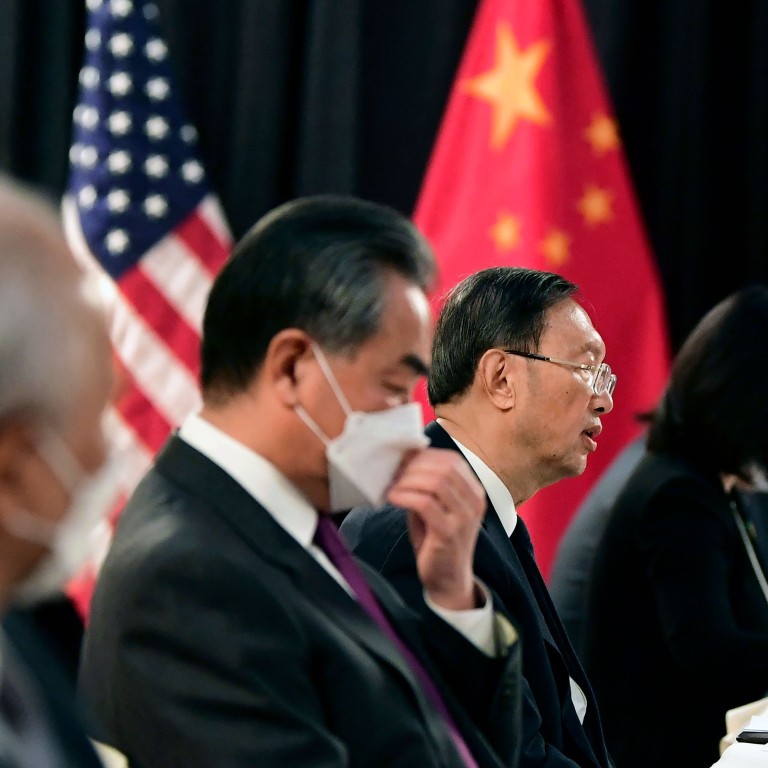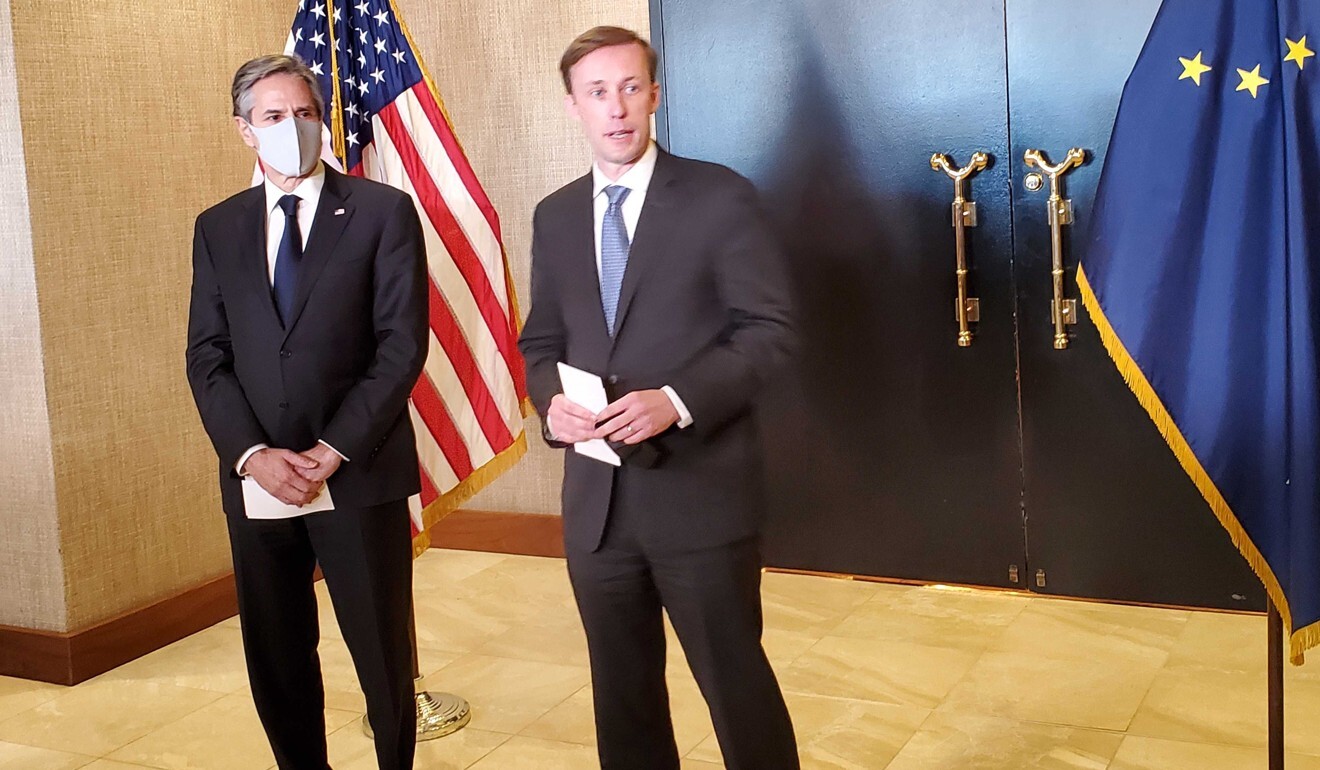
Alaska summit: China and US far apart on hot-button issues but agree to set up climate change group as talks end
- China’s top diplomat calls the discussions at the Alaska summit ‘direct, frank and constructive’ but also vows to ‘safeguard our national sovereignty’
- Topics meeting with resistance were Xinjiang, Taiwan, Hong Kong and Tibet and China’s actions in cyberspace, according to US secretary of state
Beijing also said arrangements were discussed for the countries’ diplomats and consular staff to receive Covid-19 vaccines, and to facilitate exchanges between those missions and other groups, including the media. It said travel and visa policies were also on the table, raising the prospect that restrictions could be eased.
Blinken called the talks “a very candid conversation on an expansive agenda”.
“We certainly know, and knew going in, that there are a number of areas where we are fundamentally at odds,” he said, citing Xinjiang, Taiwan, Hong Kong and Tibet and China’s actions in cyberspace. “And it was no surprise, when we raised those issues directly, we got a defensive response.”

02:23
Gloves off at top-level US-China summit in Alaska with on-camera sparring
Blinken said the two sides also discussed areas where their interests aligned, including Iran, North Korea, Afghanistan and climate change, as well as areas of difference, such as trade and economics.
“We expected to have tough direct talks on a wide range of issues, and that’s exactly what we had, the opportunity to lay out our priorities and intentions and hear from the Chinese side, their priorities and intentions,” national security adviser Jake Sullivan said.
“We were clear-eyed going in and we’re clear-eyed coming out. So we’ll go back to Washington and continue to take stock of where we are” and consult further with allies.
Sullivan said the US would deal with issues such as Afghanistan through “normal diplomatic channels”.
Chinese Foreign Minister Wang Yi stressed Beijing’s reluctance to move on matters it considers sovereign jurisdiction, while holding out the possibility of cooperation outside these areas.
“We hope the United States is not going to underestimate China’s determination to defend its territory, to safeguard its people, and maintain its righteous interest,” he said. “China and the US should move toward each other while respecting each other’s core interests. On this common ground, China is willing to adopt an opening attitude to the United States.”

Commenting on the Alaska meeting, Hong Kong’s Secretary for Civil Services Patrick Nip Tak-kuen told a seminar on Saturday that the city government should continue to support Beijing’s measures to safeguard national interests and security despite the US sanctions.
“Hong Kong has been used as a pawn by foreign forces,” he said. “In the eye of the tropical storm of US-China rivalry, nobody is off the hook. We cannot just be bystanders. The unreasonable sanctions imposed on us are a clear example that we have been affected.”
Hong Kong’s Executive Councillor Ronny Tong Ka-wah said it was rare to see high-level diplomats reprimanding each other for more than an hour in their opening statements.
He said he expected tensions between Beijing and Washington to continue to escalate and urged the US to rethink its containment policy towards China.
“The policy is self-contradictory,” he said. “The opening up of China has brought benefits to the international community.”
Alaskans are unfazed by the high-level US-China diplomacy in their midst
Analysts said the Biden administration likely would be in no hurry to sit down with Beijing again any time soon – but would be eager to hold another round of meetings with nations similarly frustrated with Beijing.
“There will be no rush with China, an obvious rush with allies,” said Richard Boucher, a senior fellow with the Watson Institute and former US consul general in Hong Kong.
As if on cue, the State Department announced on Friday that Blinken planned to visit Brussels next week for a meeting of the 29 foreign ministers of the North Atlantic Treaty Organisation (Nato) with “concerns over China and Russia” among the main topics, Philip Reeker, acting assistant secretary for European and Eurasian affairs, told reporters in Washington.
This followed Biden’s virtual hosting of the Quad – a strategic grouping comprising the US, Japan, Australia and India – this month, and a whirl of meetings in Tokyo and Seoul this week by Blinken and US Defence Secretary Lloyd Austin, who then headed for New Delhi.
But for better or worse, Washington and Beijing’s fates are inextricably linked and the US should avoid slamming the door, analysts said.
“Despite what happened in the last 24 hours, a private, sustained strategic dialogue is in the interests of the United States, not as a favour to China, but as a tool of American national security,” Richard Haass, president of the Council on Foreign Relations, told lawmakers at a hearing on Friday.
If nothing else, analysts said, the vitriol that welled up Thursday – a “frank exchange of views” in diplo-speak – served to air long-festering frustrations.
Some saw the mutual outburst as a harbinger of further worsening relations after years of trade wars, military chest-thumping and name-calling, fuelled in part by a strident US Congress.
“Whether Democrat or Republican, it will be hard to be seen as getting pushed out of the way by China,” said Grant Newsham, a research fellow at the Japan Forum for Strategic Studies and former diplomat.
Alaska summit turns civil after fiery start, but no room for hosted dinner
On Friday, a bipartisan group of 17 US senators said they would introduce a resolution “condemning the Chinese government’s ongoing crackdown against democracy and fundamental freedoms in Hong Kong”.
A day earlier, three Republican senators, including Tom Cotton of Arkansas, reintroduced a bill that would revoke the permanent normal trading status Washington has had with Beijing for the past two decades.
Other analysts said, having grandstanded for their respective home nations, the two sides would slowly and warily establish new terms and reinforce red lines.

Some early evidence of this saw a quick change in tone on both sides, with an unnamed senior administration official noting more productive talks behind closed doors within hours of the public showdown, and Chinese diplomats issuing similar statements.
Friday also saw markedly less bravado in China’s state-controlled press. “China-US Alaska dialogue ‘could still be meaningful’ despite tough opening,” said the headline on a lead article in the nationalistic Global Times.
What’s clear to both sides, analysts said, is that the old playbooks are being torn up with Washington keen to see a results-oriented relationship and the Chinese eager to show they will stand firm in the face of US criticism, especially over human rights.
“In this regard, both sides have accomplished their chief objectives for the meeting,” said Zack Cooper, research fellow at the American Enterprise Institute. “The fundamental nature of the relationship has changed, and now both sides will understand that more fully.
“This meeting was never about deliverables.”
Additional reporting by Jacob Fromer and Natalie Wong

